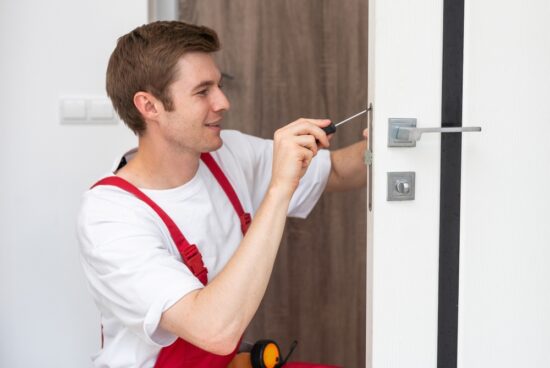
When it comes to protecting what matters most, your security needs will differ depending on whether you’re safeguarding a family home or a bustling commercial space. Locks are not a one-size-fits-all solution — and neither are locksmith services. Understanding these differences is essential when deciding which professional to call upon in Toronto, whether you’re a homeowner upgrading your entry points or a property manager overseeing multiple access levels across a building.
In both cases, the stakes are high, and the right locksmith can make all the difference. Whether you’re looking for emergency support, routine maintenance, or a full security overhaul, a reliable Toronto locksmith service can help ensure that your property’s access points are secure, functional, and future-ready.
Understanding the Core Differences Between Residential and Commercial Locks
Residential and commercial locks may appear similar on the surface, but the underlying mechanisms and intended uses differ significantly. Homes often rely on deadbolts, knob locks, and smart locks for convenience and basic protection. In contrast, commercial properties typically require higher-grade systems such as mortise locks, access control panels, and panic bars due to higher foot traffic and more complex security needs.
The construction of the lock itself is also different — commercial locks are built for durability and heavy use, while residential locks are generally optimized for ease of use and aesthetic compatibility.
Security Needs: Homes Prioritise Privacy, Businesses Demand Control
Homeowners typically focus on keeping families safe, deterring intruders, and protecting valuable possessions. Features like video doorbells, rekeying after move-in, and smart lock integration are common. In contrast, commercial properties often require restricted access, employee entry logging, and the ability to manage multiple access points remotely.
This distinction impacts everything from the kind of locks installed to the locksmith’s approach. Commercial locksmiths are often trained in more sophisticated systems, including biometric and RFID-based access, while residential locksmiths may be more experienced in dealing with household emergencies or child safety locks.
Certification, Licensing, and Compliance Requirements
When choosing a locksmith, certification and training should never be overlooked. While both residential and commercial locksmiths need to be licensed and insured in Ontario, commercial properties may require compliance with stricter codes, particularly if they’re operating in healthcare, government, or retail sectors.
For example, commercial locksmiths might need to be familiar with fire exit regulations, building code compliance, or even insurance-mandated lock specifications. This makes it even more critical to choose someone with relevant experience and credentials when securing business assets.
Emergency Support and Response Times
Being locked out of your home can be frustrating. Being locked out of your business can mean lost revenue. That’s why emergency response times matter, but they play different roles in residential and commercial contexts.
A residential locksmith needs to provide quick relief for families locked out late at night or concerned about a broken lock. On the other hand, commercial clients might require 24/7 support for malfunctioning electronic systems or a compromised storefront lock — and need documentation for audit trails after service.
Look for a provider that clearly communicates their availability and can scale their services depending on the urgency and type of property.
Maintenance, Rekeying, and Upgrades
Residential locksmith services often involve rekeying after a move, installing new locks for renovated doors, or upgrading to smart locks that sync with home security apps. Maintenance is relatively simple and typically scheduled on an as-needed basis.
Commercial locksmiths, however, may require routine maintenance contracts to manage multiple doors, security zones, and integrated alarm systems. They may also perform system-wide rekeying after staffing changes or security breaches, which requires more coordination and expertise.
Access Control Systems and Integration Capabilities
One of the most significant differences between residential and commercial locksmith needs is in access control. While homeowners may install keypads or app-controlled locks, commercial spaces often rely on scalable systems that allow for tiered access, user activity logs, remote management, and real-time alerts.
A commercial locksmith must be skilled in integrating these technologies with existing infrastructure like CCTV, motion sensors, and building management software — whereas a residential locksmith typically focuses on plug-and-play consumer-grade systems.
Custom Solutions and Scalability
Customisation plays a role in both residential and commercial locksmithing, but the scale and complexity vary. A homeowner may want custom finishes or a childproof lock for the basement, while a commercial client may need a scalable solution across multiple locations, including franchise-wide systems or multi-unit commercial buildings.
This level of strategic thinking is where experience and foresight become critical. Choosing a locksmith who can assess long-term needs, suggest scalable upgrades, and stay ahead of compliance shifts adds immense value for commercial clients.
Reputation, Reviews, and Local Experience
Whether it’s your home or your office, choosing a locksmith isn’t just about technical skill — it’s about trust. Look for locksmiths who have solid online reviews, transparent pricing, and proven experience in the Greater Toronto Area.
In particular, Toronto’s diverse neighbourhoods and building types mean familiarity with local layouts, weather-related wear on locks, and municipal code requirements can make a real difference. A locksmith who knows how to navigate everything from high-rise condos to historic storefronts will offer solutions that are practical and long-lasting.
Making a Smart, Secure Choice
In the end, the right locksmith isn’t just someone who can pick a lock or install a deadbolt — it’s someone who understands your unique security needs, offers tailored solutions, and stands by their work. Whether you’re fortifying your home’s entry points or installing a high-tech system across a commercial property, choosing a specialist with the right expertise can save time, money, and a whole lot of stress down the road.
Security begins at the door. Make sure the person installing or servicing it is up to the task.
